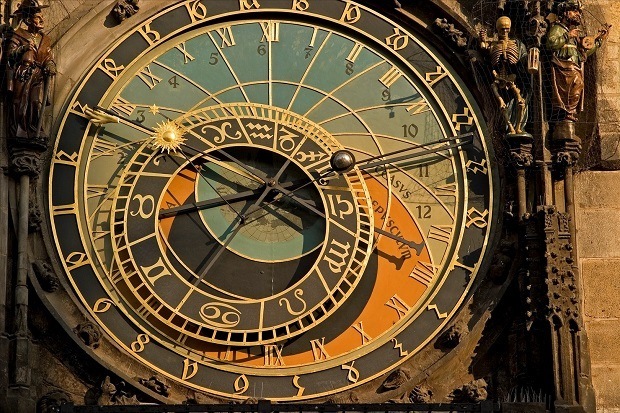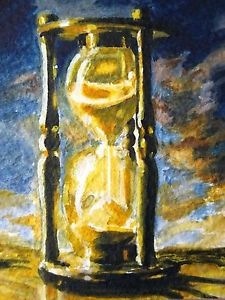The Mystery of Time

It’s About Time
I often think about time, it is a continual mystery to me. We cannot directly feel time with our senses, we can’t stop it, we can’t buy it, it can be a friend, it can be an enemy, perhaps it doesn’t exist outside our awareness. Time appears fixed and regular, yet it is also relative. There are no close synonyms for the word. It doesn’t exist in any tangible sense but our lives are built around it. Time is the ultimate treasure of and in life.
Time goes to the heart of how we organize and perceive the world and ourselves. The experience of time roots us in our productivity, creativity, happiness and mental reality. Centuries ago Saint Augustine said: “Time is the measuring by the soul of its expectation, its attention and its memory.”
William James likened the experience of time to listening to a melody. A melody needs to have distinguishable though inseparable moments. We hear each tone separately and hear the melody at the same time. We experience moments sequentially and glide on the stream of time continually. In this sense time is paradoxical: the notion of the instant requires a notion of duration, and the idea of duration cannot be without the concept of the instant.
Time Paradigms
There are different ways I experience time.
Regularity:
There is the rhythm of summer and winter, Christmas and new year, birthdays and holidays, sunrise and sunset, dark moon and full moon and the chime of the clock every hour. Circuitous time is found in nature, some measures are man-made. Time comes around and goes around forming patterns of loops in life.
Vanishing:
Time can cease to exist in our minds. When so engrossed and energized by what we do, the feeling of being suspended between markers of what was and what is coming, vanishes. I find myself in a state of what Mihaly Csikszentmihalyi calls flow, which is when we are immersed in activity in full involvement and focus.
Expansion:
There are places in nature where time slows and expands. Mountains, rivers, valleys, watching seeing the sun set and the horizon of the sea. As space and natural beauty surrounds us, and the pace of normal life subsides, time becomes a slower trickle of cherished moments, each in growing awe and wonder of the earth’s beauty.
Displacement:
Often I exist outside of the moment. Planning for the future, anticipating outcomes and even dreaming about what may be. Perhaps we regret wrong turns we took, or look back in gratitude at the good fortune of events and people in our life. Often I am not in the moment; I am somewhere in the past or somewhere in the future. I displace myself in time.
Space:
The Earth is around four and a half billion years old. The Milky Way is one hundred thousand light years across. Homo sapiens has existed about two hundred thousand years. I have been on this planet half a century. I am not even a spec in time and space. I wonder at the grandeur of the universe and insignificance of me in it. And I am astonished at space and time which I cannot comprehend.
Music:
A melody transfigures and transfixes time. It moves me. It has the power to create a parallel world in which the melody is a mirage of memories and anticipation. When listening to music, neuroscientists witness the brain’s sensory cortex take precedence, causing a feeling of timelessness. Music distorts my perception of time but also brings me into time.

How do I tell the time?
Marc Wittmann in his book Felt Time argues that the integration of various bodily processes and sensations as a function of time; heartbeat, respiration, digestion, pain, temperature and emotion, forms a gestalt which is the essence of how we perceive time. Through my body and senses we feel it, but we don’t know that we feel it.
David Eagleman, a neuroscientist, found that through alternate neural networks the brain processes different types of sensory information, auditory, tactile and visual, at differing speeds. The brain keeps the various stimuli in sync: “If the visual brain wants to get events correct time-wise, it may have only one choice: wait for the slowest information to arrive. To accomplish this, it must wait about a tenth of a second. In the early days of television broadcasting, engineers worried about the problem of keeping audio and video signals synchronized. Then they accidentally discovered that they had around a hundred milliseconds of slack; as long as the signals arrived within this window, viewers' brains would automatically re-synchronize the signals".
Nature tells us of the passing of time. The orbit of the sun, winter, summer, spring, fall. Sunrise, sunset. We can tell the time of night by the position of the stars. Our awareness of time stems from the patterns in nature. It can be euphoric to gaze at a clear blue sky, devoid of anything else. Yet there is there pure perception of time? It is always against the backdrop of life events and patterns in nature.
Only at a very recent stage in human history did we develop a synthetic way to tell the time: the clock. The division of days into hours, and hours into minutes was one of the major reasons for economic and industrial progress in human affairs. The clock split labor into measurable units; workers were paid by the hour, company time was split into shifts. Adherence to the clock was taught at schools, with intervals between classes, regulated by the school bell.
Lewis Mumford and American historian wrote: “The clock, not the steam engine, is the key machine of the modern industrial age." Activities could be better coordinated and planned, across distances and within large groups. As industrial expansion flourished our awareness of the rhythms of nature withered.

Time Warps
When a situation is novel or challenging, the brain takes in more impressions than normal. Deep and sensory varied attention creates more memories. The brain defaults in recall, thinking that if the quantity of memory measures how long an event took, it must have been lengthy. The brains’ warping of time lapses explains why the first days of your holiday always seem to last longer than the latter; the experiences are more novel and therefore more memorable.
The elapse of time makes the past seem briefer from a distance. The further back a passage of time lies, the shorter we imagine it to have lasted. Typically, the past week occupies more space in our memory than does the week before that, and far more than the same week of the previous year.
When we are bored or busy with the mundane, impressions are less and slows the tick of seconds and mulling minutes. In periods of boredom, few events happen and few impressions are made on the brain. That is why we tend to remember less of such a period and recall it as being shorter than it was afterwards.
Eventful moments expand time in our awareness and bleaker times crimp time. Martin Heidegger’s observation years ago: “Time persists merely as a consequence of the events taking place in it.”

To Do and To Be
“Do not squander time, for that is the stuff life is made of”, Benjamin Franklin said. Being more aware of time, of the type on a clock, accentuates a sense of urgency. We are more aware of time literally ticking by and less left to finish a task or get to a destination. Heightened awareness of time pulls us out of the here and now, and propels us act with a continual view to the future, immediate and distant.
But we don’t think as deeply when focused on the hour and minute hands. We are less creative when we are in a hurry. The cognitive processes in creativity involve exploration, experimenting with various views, and iterating start and finish. Creative thinking can be messy thinking. Higher watch time awareness increases our efficiency but we play around less, take a more direct path to a result and in so doing produce what is perhaps more mundane.
High awareness of time is great for doing but not so great for thinking. The modern Zeitgeist of focusing on goals and being mindful contains a paradox. Goal orientation detracts from full awareness of what is, and supplants a focus on what can be. Mindfulness, to live fully in the moment, lessens the laser on future directed actions.
William James stated just how difficult it can be to focus entirely on the here and now. With each passing moment a piece of the past and a foretaste of the future lingers and flares in the mind. Somewhere there must be a happy medium, or a healthy oscillation between future goal-directed thinking and present moment mindfulness.
Time Out
Yogi Berra humorously said: “The future is not what it used to be”. In a way this is true though. As life continues the moments become more important and the possibilities of the future become less of a beacon, and more of a glimmer on the horizon. I continue to think about time; the mystery, the mirage and the miracle thereof. Right now the sun is shining, my family is loving and happy, and I am at this point in my time.

Articles from Gert Scholtz
View blog
This is me, your Dog. · Let's leave the woofs, howls and barks. Let's talk - just you and me. I don’ ...

Ken Boddie is always a welcome presence on BeBee. He comments extensively, posts on a wide variety o ...

Time goes fast, time goes slow. · There are times when we stop to think about time itself. How we se ...
Related professionals
You may be interested in these jobs
-

Project Manager
Found in: Job Placements ZA C2 - 5 days ago
Carlysle Human Capital Centurion, South AfricaOur client fosters a young, fast-paced, high-performance culture, dedicated to delivering innovative and sustainable solutions in the mining industry. Specializing in mineral processing, offering end-to-end solutions in Projects and Engineering services, Operations Management, an ...
-

SAP Data Engineer
Found in: Talent ZA C2 - 1 week ago
iSanqa Midrand, South Africa Full timeOur client requires the services of a Data Engineer/Scientist (Advanced) - Midrand/Menlyn/Rosslyn/Home Office rotation · Amazing brand with cutting-edge technology · Excellent teams in Global team collaboration · High work-life balance with Flexible hours · Agile working environm ...
-
Customer Service Advisor- Impact Sourcing
Found in: Talent ZA C2 - 1 day ago
Teleperformance Cape Town, South AfricaOverview · Are you ready for your next challenge? Are you looking for an exciting new opportunity? If so, read on... · We work on behalf of prominent brands throughout the globe to deliver great customer service and solutions on their behalf. With a team of over 330,001 interact ...


Comments
Gert Scholtz
6 years ago #35
Praveen Raj Gullepalli Now this is really something special - a double bill of your poetry and Al Stewart's Time Passages. You make my day - thank you very much Praveen!
Ken Boddie
6 years ago #34
Just found another take on time, Gert. When rushing for that plane (which eventually came with time) results in time flying away with us, then hurried comments can lead to potentially slanderous keyboard errors on the iPhone, in #40 below. Hence, for "reading ..... in mired detail" read "..... more detail", and for "tie ..... management", a tailor's enviable objective, read "time ..... management". 😕 Incidentally, you may remember my earlier jocular post on time, which now pales in insignificance compared to your above treatise: https://www.bebee.com/producer/@ken-boddie/your-wake-up-call-sir
Gert Scholtz
6 years ago #33
Gert Scholtz
6 years ago #32
Gert Scholtz
6 years ago #31
Gert Scholtz
6 years ago #30
Ken Boddie
6 years ago #29
Jerry Fletcher
6 years ago #28
Gert Scholtz
6 years ago #27
Vincent Andrew The most succinct summary I have read: " More haste less speed". Thanks for the comment and share Vincent.
Gert Scholtz
6 years ago #26
Vincent Andrew The most succinct summary I have read: " More haste less speed". Thanks for the comment Vincent, also for sharing the post.
Gert Scholtz
6 years ago #25
Ken Boddie Thank you Ken - have a good trip and hope to hear from you later then.
mohammed khalaf
6 years ago #24
Ken Boddie
6 years ago #23
Gert Scholtz
6 years ago #22
Joyce \ud83d\udc1d Bowen Brand Ambassador @ beBee "All I know is the present becomes the past in a blink. Time is fleeting and our time here is a drop in a bucket." Very true - thank you Joyce.
Gert Scholtz
6 years ago #21
Very glad that you commented David, given your knowledge of time and space. It is true – we don’t know what we don’t know, and perhaps time and space exist ultimately in dimensions that humans will never fully comprehend, or remain totally unaware of. Thank you for sharing and your insightful comment.
Gert Scholtz
6 years ago #20
Todd Jones I enjoy my time here most when a post results in such wonderful comments such as yours Todd! “I often marvel at the unidirectional nature of time, as it flows only forward. Why? Which inevitably moves me to consider the concept of the "present". That infinitely fine partition that separates the past from the future. By the time I type the period at the end of this sentence, it is all in the past.” Thanks for this and also for sharing the post.
Gert Scholtz
6 years ago #19
Gert Scholtz
6 years ago #18
Gert Scholtz
6 years ago #17
Pascal Derrien Hope to see you as the rocket man go with the time capsule :). Thanks Pascal, for reading and sharing this on the timeline.
Joyce 🐝 Bowen Brand Ambassador @ beBee
6 years ago #16
Gert Scholtz
6 years ago #15
Franci\ud83d\udc1dEugenia Hoffman, Brand Ambassador @ beBee This is such a descriptive quote you gave: "“Time flows in the same way for all human beings; every human being flows through time in a different way.” Yasunari Kawabata. Thank you, also for sharing the post.
Gert Scholtz
6 years ago #14
Joanne Gardocki Thank you for reading and commenting Joanne.
Gert Scholtz
6 years ago #13
Laurent Boscherini I actually had to look up "Eulogia" in the dictionary :) Thanks Laurent - now I know a new word related to time.
Gert Scholtz
6 years ago #12
Pascal Derrien
6 years ago #11
Randall Burns
6 years ago #10
Paul Walters
6 years ago #9
David B. Grinberg
6 years ago #8
Laurent Boscherini
6 years ago #7
Joel Anderson
6 years ago #6
Actually thank you for a great post. After I read it caused me to think back to my walk with Heraclitus and the context and perspective behind so much going on in our world. Gert Scholtz just know that you rock. Keep making a difference: one person, one step, one moment, one snap shot in time regardless of its relativity and the physical or abstract nature of that point of reference.
Gert Scholtz
6 years ago #5
Sara Jacobovici Thank you for your wonderful comment Sara. Time as a sense is intriguing – often my family will ask me what the time is and I normally get it right without looking at my watch. Even if I wake in the night I usually know what the time is. Perhaps this is an experience of time as a sense. I love your modified quote: Time is the stuff we are made of – indeed it seems we are!
Gert Scholtz
6 years ago #4
Sara Jacobovici
6 years ago #3
Gert Scholtz
6 years ago #2
Gert Scholtz
6 years ago #1
Jordan Sands Thanks for that - my mind was warping - is indeed half a century.